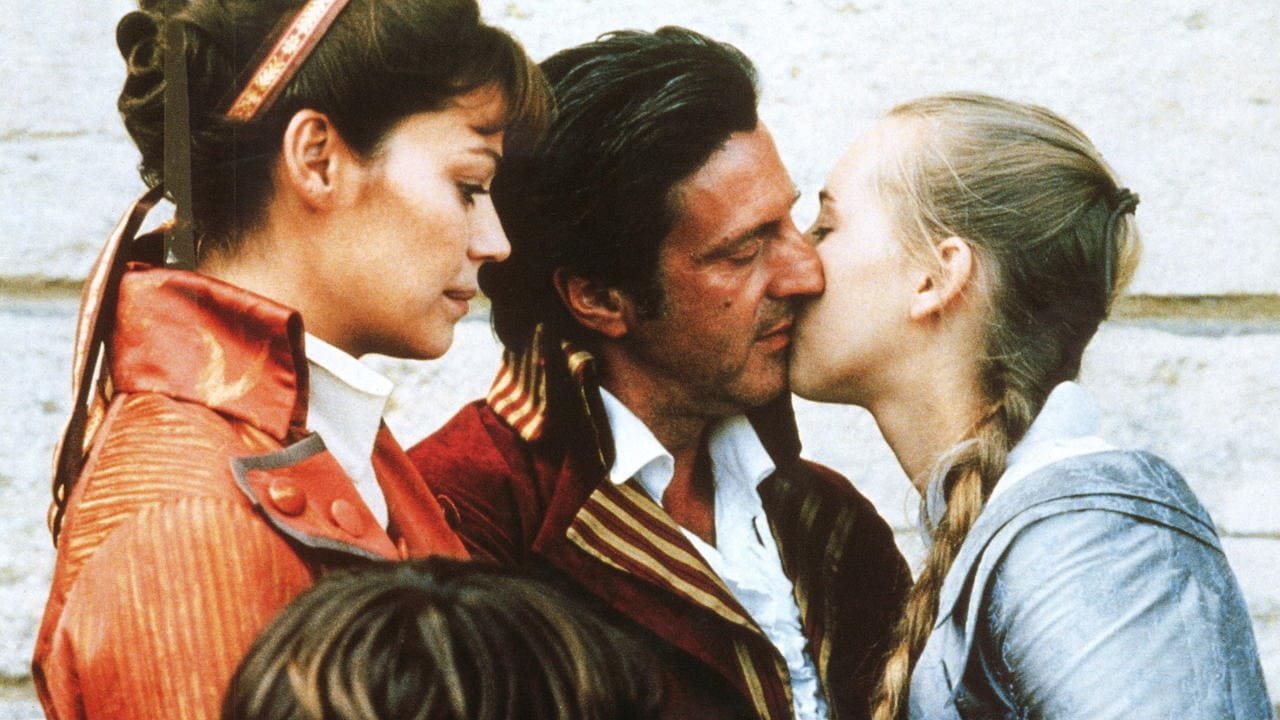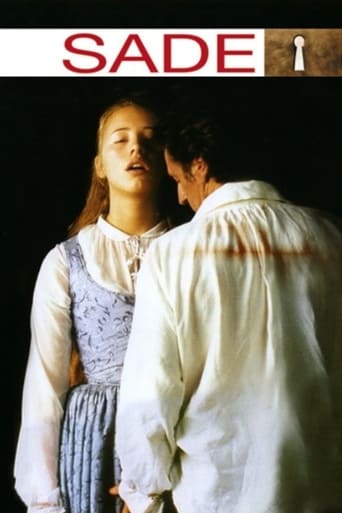

A lot of perfectly good film show their cards early, establish a unique premise and let the audience explore a topic at a leisurely pace, without much in terms of surprise. this film is not one of those films.
... View MoreExcellent and certainly provocative... If nothing else, the film is a real conversation starter.
... View MoreThe movie is wonderful and true, an act of love in all its contradictions and complexity
... View MoreAn old-fashioned movie made with new-fashioned finesse.
... View MoreThis semi-biographical/semi-fictional account of the Marquis of de Sade (the great Daniel Autiel) is set during the "reign of terror" period of the French Revolution. The Jacobin revolutionaries had no idea what to do with Sade, who had been freed from the Bastile in 1789, but was also a symbol of the decadence of the noble class with his undisguised atheism, his sex crimes that had scandalized even the other decadent nobles, and above all his scandalous, decadent, and blasphemous plays and novels. So they put him into a "asylum"/prison on the estate of a hypocritical/opportunistic nobleman-doctor, along with a lot of other noble families hiding out from the terror (and paying financially for the privilege). There they reassert the old order, for instance, with wealthier noblemen taking liberty with the pretty young wives of poorer nobleman. Sade meanwhile tries to put on his scandalous plays under the aegis of the new regime and supposedly to preach AGAINST atheism. This movie covers roughly the same territory as "Marat/Sade" and "Quills", but drops any idea of Sade actually being insane. Here he is portrayed as quite sane--and even heroic--in comparison to the hypocrites surrounding him.This particular movie focuses less on his work though and more on two fictionalized (if not entirely fictional) subplots. One involves Sade's manipulation of the mother of his child, who is now the mistress of a high-ranking Jacobin, "Fournier", who she in turn manipulates to save Sade from the guillotine. "Fournier" is a sympathetic character, a child of the revolution who is doomed to be eaten by it, and Sade indirectly but skillfully manipulates him like a character in his one of his plays.The perhaps more interesting and certainly more sexy story involves Sade befriending the young daughter of a rich nobleman (Isild LeBesco), who he seems to simultaneously be sexually debauching for his own amusement while also saving her from the guillotine by getting her pregnant by other men (of lowlier social stations, of course). 17-year-old LeBesco is absolutely incredibly here. First off, is her truly unique looks--she is pale and blue-eyed, but actually part Asian, and is capable of looking both "ugly" and very beautiful. Second, is her voluptuous body which is just unambiguously beautiful (and not surprisingly, she shows it off a lot in her movies). Most significantly though is her ACTING. She goes toe-toe with Auteil as a precocious young girl who is intellectually Sade's equal, but still a virgin naïf in sexual matters. Her "deflowering" scene is absolutely incredible as once again Sade conducts a near-orgy like it's one of his plays.This probably isn't the most historically accurate account of the Marquis De Sade (having read of the truly appalling "120 Days of Sodom", I have trouble believing the real guy was this moral and NOT in some sense insane). But it's a very enjoyable movie.
... View MoreAn admirable antidote to Philip Kaufman's tiresome and campy Quills(2000)with Geoffrey Rush, this features a fluent, strangely appealing, only mildly reptilian Daniel Auteuil, whose tireless acting fluency here reminded me of Al Pacino. No "de": Sade is at pains to deny he's a noble and favors the revolution and expresses contempt for Christianity and particularly the notion of a Supreme Being which the momentarily ruling Robespierre is promoting. Sade is being held with a lot of aristos at a big "asylum," actually a country-club style prison at Pictus, a former convent with a grand park where everyone is paying a manager for what favors they can afford hoping to remain there till the guillotine is retired or they start beheading some other group. In fact the Reign of Terror ends and Robespierre and his Jacobins are out and the asylum is vacated . (This all takes place ten years before Quills, I'm told.) But meanwhile Pictus is a bizarre mixture of frivolity and horror, since cart-loads of decapitated bodies are being brought to be buried in mass graves, leaving a horrible stench and reminding the inhabitants they could be next to go.Sade's libertine stances and immense self confidence make him attractive to rebellious young people and he particularly chooses to instruct and flirt with the young Emilie de Lancris, played by "gamine du jour" (Hoberman) Isild Le Besco (of the 2004 À tout de suite). Eventually, in the film's most "shocking" scene, Sade arranges for Emilie to be deflowered in his presence by the tall young gardener, Augustin (Jalil Espert), getting Augustin to whip him first, which turns Autustin on. The longtime mistress he calls "Sensible" (Marianne Denicourt) lives in town with their little boy and the uptight, sadistic Fournier (Grégoire Colin), a nervous member of Robespierre's inner circle. There are scenes with Fournier and Sensible; and others when Sensible and the boy visit Sade, whom Fournier doesn't like, but protects out of love for Sensible. There is also an orientalist pageant depicting the "joys of captivity" which begins as a staging of one of Sade's milder plays. There are astonishingly bright-colored and eccentric costumes, which are apparently true to the fashions of the Terror. Jacquot, in a brief interview which is the DVD's only extra, says he took pains to have all details authentic. But it tends to feel like a project whose vague aim was simply to make a movie about Sade starring Daniel Auteuil. In that Jacquot succeeded; otherwise; he rehabilitates the writer's reputation, or presents him more as a serious figure than an ogre, monster of depravity, or household word. An interesting and smart film, but not a profoundly memorable one.
... View MoreThe title is a misnomer:the movie depicts barely one year of the so-called "divin marquis" .Twas a hard time for him 'cause he was threatened by the guillotine :the quiet joys of the reign of Terror .Historically speaking,the background is rather sketchy: "the fête De l'et re supreme",Robespierre's failed attempt to create a secular religion,his downfall ,a heaven sent opportunity for showing Doctor Guillotin's sinister machine at work (full speed).As far as Sade is concerned ,it's a downright mediocre affair :he's waiting in a former nunnery with other nobles ,a golden cage if you compare it to ,say,Marie-Antoinette's or scientist Lavoisier's fates,and he exchanges futile conversations with a young virgin about death,love and other trivia.There's the obligatory "daring" scene but you've got to be patient because it's a long time before it comes on the screen.And anyway ,by today's standards ,can we call that risqué? Cy Enfield's "De Sade" ,which enjoys one of the lowest ratings of the IMDb ,is at least entertaining ,and Keir Dullea was a more credible marquis than the aging Auteuil.And it featured John Huston.
... View MoreDaniel Auteuil makes an excellent Marquis de Sade (even better than Geoffrey Rush in Quills) in this intelligent film by one of France's very best directors, Benoit Jacquot (The School of Flesh, Pas De Scandale). Unlike the aforementioned Philip Kaufman picture, which examined the issue of censorship by using Sade and his work as a backdrop, this film intends to explore the sides of the infamous pornographer as philanthropist. While being held prisoner in a grand chateau with many other nobles following the French revolution, Sade befriends a curious young woman and teaches her a thing or two about growing up. The relationship they develop is genuine and in the end very moving, mostly because while instructing her to loosen up she teaches him how he can reclaim his emotional self and learn to once again love the society that he has dismissed as conventional and narrow. Not Jacquot's best, but a worthy piece of work.
... View More